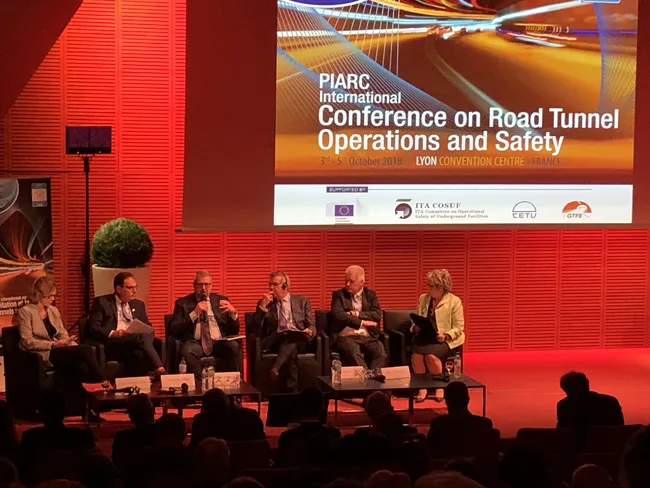The 8th APEC Transport Ministers’ Meeting in Tokyo on 4-6 Septembersaw high-level discussions on how to enhance connectivity in the Asia-Pacific region through high-quality transport. As a guest, the International Transport Forum (ITF) was also heavily involved in the event, as Guy Woodford reports
A transport Connectivity Map visualising Asia-Pacific’s ideal transport network in 2020, and a Quality Transport vision for the region encompassing convenience, safety, security, and sustainability, will b
December 2, 2013
Read time: 4 mins

The 8th APEC Transport Ministers’ Meeting in Tokyo on 4-6 Septembersaw high-level discussions on how to enhance connectivity in the Asia-Pacific region through high-quality transport. As a guest, the International Transport Forum (ITF) was also heavily involved in the event, as Guy Woodford reports
A transport Connectivity Map visualising Asia-Pacific’s ideal transport network in 2020, and a Quality Transport vision for the region encompassing convenience, safety, security, and sustainability, will be developed by APEC Transport Ministers following discussions at the recent 8th APEC Transport Ministers’ Meeting in Tokyo.
In between establishing the two key visionary projects, the1102 International Transport Forum’s (ITF) Secretary-General, José Viegas, joined ministers at the prestigious three-day APEC event and reported on the ITF Summit on ‘Funding Transport’ held in Leipzig, Germany in May 2013. During his presentation to ministers titled Improving the Environment for Investment, Viegas stressed the importance of trust between public and private partners to ensure successful infrastructure projects, as well as the need to provide a steady number of projects to diversify large-scale project investment risk.
Viegas also highlighted McKinsey Global Institute figures showing a long-term transport infrastructure funding gap between developed and emerging economies. According to the MGI research, while developed economies averaged 1.5% and 1.3% of GDP for transport infrastructure spending in 1980 and 2008, emerging economies spent an average of 1.9% and 3.1% in the same comparable years.
Viegas noted that most governments now look to public private partnerships (PPP) to increase investment. This, he said, allowed governments to raise investment when public finances are tight, while also circumventing limits on public spending. “The record of PPP performance is mixed, their fiscal sustainability must be reinforced,” he said.
Referring again to differences between developed and emerging economies, Viegas pointed to how the2332 World Bank sees a “$3-4 trillion” transport infrastructure funding gap in the developing world.
During the key Tokyo talks, Viegas held seven bilaterals, meeting with Minister Gerry Brownlee of New Zealand, the upcoming 2014/15 ITF presidency country, and Minister Maksim Sokolov of Russia. He also exchanged views with Senior Vice-Minister Hiroshi Kajiyama of Japan, US Deputy Secretary of Transport John Porcari, Vice-Minister Yeo Hyung-ku of Korea, Mexican Undersecretary of Transport Carlos F. Almada, and Andrew Wilson, Deputy Secretary of Infrastructure and Transport, Australia.
After attending the latest APEC Transport Ministers Meeting, Viegas travelled to The Hague, in The Netherlands, for the FIA Mobility Conference Week. During his presentation at the conference titled Urban Mobility at the crossroads: social megatrends, tech option, policy choices, Viegas said that the 50% of the world’s seven billion population currently urbanised, will increase to 80% of nine billion people urbanised in 40 years, creating huge pressure on urban mobility infrastructure.
Of current urban-based car use, he said, “Private cars are one of the most under-used form of capital, 90% of the time inactive; in most cities no more than 25% of cars are active at the same time. But flexibility and convenience can justify willingness to pay.”
Viegas pointed to a possible gradual shift from car ownership to car-based mobility based on vehicle sharing which could reduce costs and congestion, while also releasing public space for pedestrians and cyclists by having lower car parking needs. Viegas said that higher utilisation of fewer cars should allow for a swifter incorporation of new vehicle technology, leading to a faster reduction of environmental aggression.
The rise of autonomous cars, Viegas noted, could assist older citizens’ mobility, as they are no longer physically and mentally fit to drive, but still possess good self-awareness and crave independence. Viegas also suggested that autonomous cars could have an adverse economic impact on the taxi industry. A smaller middle class in many countries could, suggests Viegas, result in greater use of two-wheel motorised, assisted, or non-motorised vehicles.
“On urban mobility, multiple options are open, the future is not determined, but the policy choices we make will have strong consequences: on the distribution of access to jobs and social facilities; on the evolution of lifestyles; and on the evolution of cities themselves,” Viegas concluded.
A transport Connectivity Map visualising Asia-Pacific’s ideal transport network in 2020, and a Quality Transport vision for the region encompassing convenience, safety, security, and sustainability, will be developed by APEC Transport Ministers following discussions at the recent 8th APEC Transport Ministers’ Meeting in Tokyo.
In between establishing the two key visionary projects, the
Viegas also highlighted McKinsey Global Institute figures showing a long-term transport infrastructure funding gap between developed and emerging economies. According to the MGI research, while developed economies averaged 1.5% and 1.3% of GDP for transport infrastructure spending in 1980 and 2008, emerging economies spent an average of 1.9% and 3.1% in the same comparable years.
Viegas noted that most governments now look to public private partnerships (PPP) to increase investment. This, he said, allowed governments to raise investment when public finances are tight, while also circumventing limits on public spending. “The record of PPP performance is mixed, their fiscal sustainability must be reinforced,” he said.
Referring again to differences between developed and emerging economies, Viegas pointed to how the
During the key Tokyo talks, Viegas held seven bilaterals, meeting with Minister Gerry Brownlee of New Zealand, the upcoming 2014/15 ITF presidency country, and Minister Maksim Sokolov of Russia. He also exchanged views with Senior Vice-Minister Hiroshi Kajiyama of Japan, US Deputy Secretary of Transport John Porcari, Vice-Minister Yeo Hyung-ku of Korea, Mexican Undersecretary of Transport Carlos F. Almada, and Andrew Wilson, Deputy Secretary of Infrastructure and Transport, Australia.
After attending the latest APEC Transport Ministers Meeting, Viegas travelled to The Hague, in The Netherlands, for the FIA Mobility Conference Week. During his presentation at the conference titled Urban Mobility at the crossroads: social megatrends, tech option, policy choices, Viegas said that the 50% of the world’s seven billion population currently urbanised, will increase to 80% of nine billion people urbanised in 40 years, creating huge pressure on urban mobility infrastructure.
Of current urban-based car use, he said, “Private cars are one of the most under-used form of capital, 90% of the time inactive; in most cities no more than 25% of cars are active at the same time. But flexibility and convenience can justify willingness to pay.”
Viegas pointed to a possible gradual shift from car ownership to car-based mobility based on vehicle sharing which could reduce costs and congestion, while also releasing public space for pedestrians and cyclists by having lower car parking needs. Viegas said that higher utilisation of fewer cars should allow for a swifter incorporation of new vehicle technology, leading to a faster reduction of environmental aggression.
The rise of autonomous cars, Viegas noted, could assist older citizens’ mobility, as they are no longer physically and mentally fit to drive, but still possess good self-awareness and crave independence. Viegas also suggested that autonomous cars could have an adverse economic impact on the taxi industry. A smaller middle class in many countries could, suggests Viegas, result in greater use of two-wheel motorised, assisted, or non-motorised vehicles.
“On urban mobility, multiple options are open, the future is not determined, but the policy choices we make will have strong consequences: on the distribution of access to jobs and social facilities; on the evolution of lifestyles; and on the evolution of cities themselves,” Viegas concluded.







